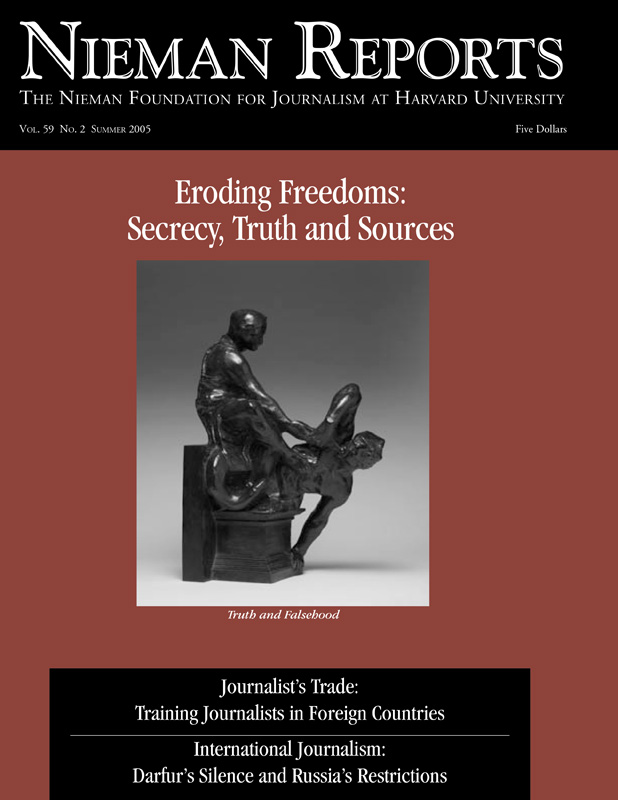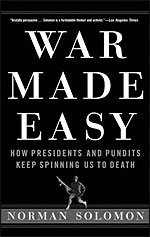“War Made Easy” is a severe indictment of a war-minded U.S. government—not just the current Bush administration— and of an American press all too willing, even eager, to go along. Ultimately, it’s also an indictment of the American public as gullible, ill- and misinformed by that pliant press, and predictable in the American faith that the President as national and world leader does not stoop to lying and deceit.
Though marred by polemical excess, Solomon’s book is valuable particularly, in my view, for its scorching insistence that war, any war, is an explosion of fear, violence, death and destruction—not least of innocent men, women and children—by no means limited to an enemy’s armed forces. In the Iraqi invasion, these terrible consequences are primarily dealt by American troops, and Solomon insists on the truth that the blood is on all our hands.
Nor is it washed away by the hightech weapons that Solomon rightly sees as endlessly fascinating to the Americans who pay for and take pride in them. Deaths from a “smart bomb,” after all, or destruction from 30,000 feet in the air, or bodies mangled by cruise missiles launched hundreds of miles away, are as real and bloody as if caused hand-to-hand with knives or small arms. Solomon does not accept, either, as Americans tend to do, that a Scud missile fired by Iraqis at Israelis is an “evil” weapon of “terrorism” when a far more explosive rocket launched from a U.S. ship against Iraqis—or anybody—is a legitimate weapon of war, which is sometimes quite all right to send as a mere “message” from us to them, however many noncombatants it might maim or kill on delivery.
Solomon insists—rightly I believe— that the Pentagon’s brilliant public relations scheme for “embedding” U.S. journalists into military units in Iraq served military needs far more than it provided the public with necessary information. (He and I recognize the too few worthy exceptions to the general camaraderie.) For parroting government views or promoting patriotism over factual information, he blasts some journalists by name: Tom Friedman of The New York Times, Jim Lehrer of PBS, Dan Rather of CBS, even the generally revered Walter Cronkite, to identify a few among many. He’s scathing about all those retired and beribboned military officers parading across U.S. television screens in the guise of independent analysts who mostly justify with rosy views whatever war might be going on—though he’s not more critical of these talking heads than of the networks that employ them (sometimes after Pentagon clearance).
Solomon’s unabashed j’accuse about the disgraceful eagerness of the U.S. press to “play on the team” whenever the President or the Pentagon brings on a war should cause some faces to turn red at the networks and at leading newspapers and magazines—particularly the faces of those publishers, editors and reporters most voluble in paying lip service to the First Amendment and to their alleged “watchdog” role. This and most other charges Solomon makes are reasonably well supported, usually by newspaper or television quotations that speak for themselves. Unfortunately, he too often cites authorities like Noam Chomsky and I.F. Stone, sound enough in themselves, who can be expected to agree with most assertions in “War Made Easy;” footnoting less identified sources might have been more convincing.
That observation leads to two other criticisms, the first of which is that Solomon flits back and forth between Iraq and Vietnam, Panama and Nicaragua, Kosovo and the Gulf War—from President Reagan through both Bushes and Clinton and back to Jimmy Carter and Gerald Ford, with of course a few swipes at Richard Nixon and Lyndon Johnson. Sometimes it’s difficult to know which era, which President, which war he’s discussing; that tends to support Solomon’s thesis that the United States engages in too many wars, too often and too easily, and that the President and the Pentagon, with the aid of the press, justify them all with public relations techniques and well-tried appeals to American arrogance. Still, the absence of a historically defined timeline tends to a degree of incoherence.
The second criticism is more fundamental. Solomon holds his ideas strongly and fearlessly. I agree with most of them, but that only causes me to deplore the frequent excess—as I see it—with which he expresses them. I’d like to read a dispassionate discussion of the United States predilection for war as policy, and for the press’s tendency to support policy and war, written almost as a lawyer’s brief, without high-powered polemics and dominating assumptions of bad motives, conspiracies, cowardice and power-seeking. All of those things may have been prominent in the recent record cited in “War Made Easy,” and Solomon no doubt would insist that such a horrendous record demands an impassioned response. Maybe so, but I believe in the old journalist’s creed, so often abandoned—“just the facts, please.”
Properly followed, that approach needn’t result in the sterile objectivity sometimes posed as the only alternative to editorializing. And despite his justified indignation, Solomon sometimes demonstrates in this book that nothing speaks louder or with more telling truth than the simple facts.
Tom Wicker, a 1958 Nieman Fellow, was a political reporter for The New York Times from 1960 until he became the newspaper’s “In the Nation” columnist from 1966 to 1991.
Though marred by polemical excess, Solomon’s book is valuable particularly, in my view, for its scorching insistence that war, any war, is an explosion of fear, violence, death and destruction—not least of innocent men, women and children—by no means limited to an enemy’s armed forces. In the Iraqi invasion, these terrible consequences are primarily dealt by American troops, and Solomon insists on the truth that the blood is on all our hands.
Nor is it washed away by the hightech weapons that Solomon rightly sees as endlessly fascinating to the Americans who pay for and take pride in them. Deaths from a “smart bomb,” after all, or destruction from 30,000 feet in the air, or bodies mangled by cruise missiles launched hundreds of miles away, are as real and bloody as if caused hand-to-hand with knives or small arms. Solomon does not accept, either, as Americans tend to do, that a Scud missile fired by Iraqis at Israelis is an “evil” weapon of “terrorism” when a far more explosive rocket launched from a U.S. ship against Iraqis—or anybody—is a legitimate weapon of war, which is sometimes quite all right to send as a mere “message” from us to them, however many noncombatants it might maim or kill on delivery.
Solomon insists—rightly I believe— that the Pentagon’s brilliant public relations scheme for “embedding” U.S. journalists into military units in Iraq served military needs far more than it provided the public with necessary information. (He and I recognize the too few worthy exceptions to the general camaraderie.) For parroting government views or promoting patriotism over factual information, he blasts some journalists by name: Tom Friedman of The New York Times, Jim Lehrer of PBS, Dan Rather of CBS, even the generally revered Walter Cronkite, to identify a few among many. He’s scathing about all those retired and beribboned military officers parading across U.S. television screens in the guise of independent analysts who mostly justify with rosy views whatever war might be going on—though he’s not more critical of these talking heads than of the networks that employ them (sometimes after Pentagon clearance).
Solomon’s unabashed j’accuse about the disgraceful eagerness of the U.S. press to “play on the team” whenever the President or the Pentagon brings on a war should cause some faces to turn red at the networks and at leading newspapers and magazines—particularly the faces of those publishers, editors and reporters most voluble in paying lip service to the First Amendment and to their alleged “watchdog” role. This and most other charges Solomon makes are reasonably well supported, usually by newspaper or television quotations that speak for themselves. Unfortunately, he too often cites authorities like Noam Chomsky and I.F. Stone, sound enough in themselves, who can be expected to agree with most assertions in “War Made Easy;” footnoting less identified sources might have been more convincing.
That observation leads to two other criticisms, the first of which is that Solomon flits back and forth between Iraq and Vietnam, Panama and Nicaragua, Kosovo and the Gulf War—from President Reagan through both Bushes and Clinton and back to Jimmy Carter and Gerald Ford, with of course a few swipes at Richard Nixon and Lyndon Johnson. Sometimes it’s difficult to know which era, which President, which war he’s discussing; that tends to support Solomon’s thesis that the United States engages in too many wars, too often and too easily, and that the President and the Pentagon, with the aid of the press, justify them all with public relations techniques and well-tried appeals to American arrogance. Still, the absence of a historically defined timeline tends to a degree of incoherence.
The second criticism is more fundamental. Solomon holds his ideas strongly and fearlessly. I agree with most of them, but that only causes me to deplore the frequent excess—as I see it—with which he expresses them. I’d like to read a dispassionate discussion of the United States predilection for war as policy, and for the press’s tendency to support policy and war, written almost as a lawyer’s brief, without high-powered polemics and dominating assumptions of bad motives, conspiracies, cowardice and power-seeking. All of those things may have been prominent in the recent record cited in “War Made Easy,” and Solomon no doubt would insist that such a horrendous record demands an impassioned response. Maybe so, but I believe in the old journalist’s creed, so often abandoned—“just the facts, please.”
Properly followed, that approach needn’t result in the sterile objectivity sometimes posed as the only alternative to editorializing. And despite his justified indignation, Solomon sometimes demonstrates in this book that nothing speaks louder or with more telling truth than the simple facts.
Tom Wicker, a 1958 Nieman Fellow, was a political reporter for The New York Times from 1960 until he became the newspaper’s “In the Nation” columnist from 1966 to 1991.




